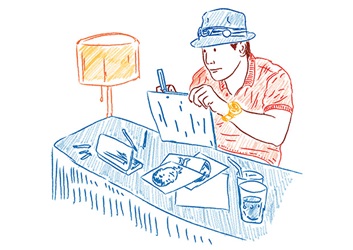How Enjoyment, Learning And Performance Energises You At Work
To be energised at work, the elements of enjoyment and learning are as necessary as performing well. MS TAN HUI MIN tells Challenge why.

What does work mean to you? Is it a means of earning an income, an obligation to fulfil, or even a rat race? How we perceive work influences our attitude and actions at work. For example, if we think of work as a rat race, we will view our colleagues as competitors and act only in our self-interest. If it is just a means of earning an income, we may not have a spirit of excellence and get by doing just the bare minimum. The lenses we use to define work can hinder us from reaching our full potential.
The good news is, we can embrace more empowering definitions of work. One approach is to apply the performance-enjoyment-learning, or PEL, framework.
The framework, developed by Timothy Gallwey in his book The Inner Game of Work, is based on the observation that we are at our best when there is “an ease and excellence in performance, a self-generated interest in learning, and a natural enjoyment independent of the results.”
Many of us associate work with performance alone. However, consciously or not, the elements of learning and enjoyment are also present. We are often intuitively learning from our day-to-day experiences at work. If not, we would stagnate, or worse, devolve. We also continually experience emotions toward our work that could range from elation to indifference to dread.
The three elements of performance, enjoyment and learning are interdependent. Emphasising performance without nurturing learning and enjoyment would affect our performance in the long term. In my previous role at a private sector organisation, I was so focused on completing the substantial amount of work that needed to be done, I ended up resenting my job even though I was good at it.
Because I was always short on time, I was also not deliberately looking for learning opportunities. After some time I started to stagnate. The combination of constant stress and feeling that I was not growing eventually led me to leave the position.
However, the inverse could also be true where we intentionally build on the interdependency between the three elements to create an upward spiral. For example, when we learn and master any skill that enhances our performance, we tend to naturally enjoy our work more.
In the past six months, one of my learning goals has been to understand what energises or de-energises me at work. I do that by listing down the high and low points I experience daily. After some time, a pattern emerges and I am able to identify the conditions that fuel or drain my energy. I can then try to recreate or seek out similar energising conditions, and better manage de-energising conditions to draw more enjoyment from my work. When I enjoy my work, there is an innate desire to give my best, which results in better quality work.
The PEL framework can also be applied when working in groups and teams. I was part of a work planning session for a large initiative that involved colleagues from a number of agencies. When we first planned the session, it was very focused on performance so that we could complete the work plan by the end of the session.
It was only after a colleague highlighted the need to bond this group of people — who would be working together over a few months — and ensure that they grew from this experience that we introduced elements of enjoyment and learning. The result was a much more vibrant session, with opportunities for people to get to know one another, have fun and learn from one another.
So let me encourage you to start applying the PEL framework, so that we can create more fulfilling work experiences both for ourselves and for the people we work with.
The good news is, we can embrace more empowering definitions of work. One approach is to apply the performance-enjoyment-learning, or PEL, framework.
The framework, developed by Timothy Gallwey in his book The Inner Game of Work, is based on the observation that we are at our best when there is “an ease and excellence in performance, a self-generated interest in learning, and a natural enjoyment independent of the results.”
Many of us associate work with performance alone. However, consciously or not, the elements of learning and enjoyment are also present. We are often intuitively learning from our day-to-day experiences at work. If not, we would stagnate, or worse, devolve. We also continually experience emotions toward our work that could range from elation to indifference to dread.
The three elements of performance, enjoyment and learning are interdependent. Emphasising performance without nurturing learning and enjoyment would affect our performance in the long term. In my previous role at a private sector organisation, I was so focused on completing the substantial amount of work that needed to be done, I ended up resenting my job even though I was good at it.
Because I was always short on time, I was also not deliberately looking for learning opportunities. After some time I started to stagnate. The combination of constant stress and feeling that I was not growing eventually led me to leave the position.
However, the inverse could also be true where we intentionally build on the interdependency between the three elements to create an upward spiral. For example, when we learn and master any skill that enhances our performance, we tend to naturally enjoy our work more.
In the past six months, one of my learning goals has been to understand what energises or de-energises me at work. I do that by listing down the high and low points I experience daily. After some time, a pattern emerges and I am able to identify the conditions that fuel or drain my energy. I can then try to recreate or seek out similar energising conditions, and better manage de-energising conditions to draw more enjoyment from my work. When I enjoy my work, there is an innate desire to give my best, which results in better quality work.
The PEL framework can also be applied when working in groups and teams. I was part of a work planning session for a large initiative that involved colleagues from a number of agencies. When we first planned the session, it was very focused on performance so that we could complete the work plan by the end of the session.
It was only after a colleague highlighted the need to bond this group of people — who would be working together over a few months — and ensure that they grew from this experience that we introduced elements of enjoyment and learning. The result was a much more vibrant session, with opportunities for people to get to know one another, have fun and learn from one another.
So let me encourage you to start applying the PEL framework, so that we can create more fulfilling work experiences both for ourselves and for the people we work with.
Ms Tan Hui Min is Senior Assistant Director at the PS21 Office, Public Service Division, and editorial advisor for Challenge. This is the third in a series of reflections from participants of the Leading & Sustaining Change Programme at the Civil Service College.
- POSTED ON
May 1, 2015
- TEXT BY
Tan Hui Min
-
Out of Office

The Perks of Not Being A Wallflower








